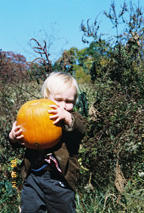RALEIGH, North Carolina – North Carolina State University researchers are exploring the relationship between farmers and childcare facilities – a segment of the local food movement that holds a myriad of economic and social opportunities.
Graduate student Jacob Rutz and local foods Extension specialist J. Dara Bloom, through a $10,636 Southern Sustainable Agriculture Research & Education (SSARE) Graduate Student Grant, conducted case studies of childcare centers, farmers and distributors to characterize the Farm to Childcare relationship.
Rutz said that Farm to Childcare is gaining increased attention in the local foods movement for a variety of reasons: Lower barriers to entry, more flexibility in food use, limited certification requirements, and year-round demand. In the study, the researchers found that while economic and logistical challenges remain, opportunities exist to strengthen those relationships.
“The purpose of this project was to understand the barriers and opportunities for small, diversified fruit and vegetable farmers to sell to low-income childcare centers in an urban county in North Carolina,” said Bloom. “Childcare centers value purchasing local food for meals and snacks, and farmers value selling locally to childcare centers for the social connectivity to their communities. But Farm to Childcare is a fairly new market that has very little literature identifying the benefits and challenges to potential participants.”
In the project (GS15-140), “Farm-to-Childcare in North Carolina: A holistic case study,” researchers found that while childcare centers were socially motivated, they faced financial and labor challenges to acquiring local foods.
Transitioning from canned or frozen foods to fresh and local foods required extra preparation time from cooks. Distribution was an issue, and the facilities had limited storage and kitchen equipment, which required them to purchase smaller quantities. For farmers, that translated into low profits and ultimately an unsustainable direct-sales relationship.
“Farmers expressed that selling to centers was a challenging experience; while they felt that their product was desired, the low volume and infrequent purchases were not sustainable for their bottom line,” said Rutz. “Farmers felt that direct community service with child care centers was better left to organizations with explicit missions for serving children or low-income clients.”
Researchers found that not-for-profit food hubs provided that sense of connectivity and infrastructure, but in order to work directly with childcare centers, they needed to increase their food sales in order for their operations to remain profitable. For-profit distributors were the most successful in satisfying the general food needs of the childcare centers, but they lacked the sense of connection with local farmers that the childcare facilities sought.
In fact, said Bloom, the motivation for the for-profit distributors was also primarily socially driven, as they reported buying local produce infrequently improved their bottom line.
Despite the challenges, the researchers did come away with some recommendations to strengthen the Farm to Childcare relationship, including developing options to sell “ugly” vegetables that are unsellable in wholesale markets, creating educational programming through Cooperative Extension to childcare centers about agriculture production and marketing practices, and building a stronger local food economy through additional support of existing markets.
Researchers are developing a best practices “Farm to Childcare Procurement Resource” guide for those farmers who are interested in participating in Farm to Childcare programs.
Published by the Southern Region of the Sustainable Agriculture Research and Education (SARE) program. Funded by the USDA National Institute of Food and Agriculture (NIFA), Southern SARE operates under cooperative agreements with the University of Georgia, Fort Valley State University, and the Kerr Center for Sustainable Agriculture to offer competitive grants to advance sustainable agriculture in America's Southern region. This material is based upon work that is supported by the National Institute of Food and Agriculture, U.S. Department of Agriculture, through Southern Sustainable Agriculture Research and Education, under sub-award number: GS15-140. USDA is an equal opportunity employer and service provider. Any opinions, findings, conclusions, or recommendations expressed in this publication are those of the author(s) and do not necessarily reflect the view of the U.S. Department of Agriculture.
